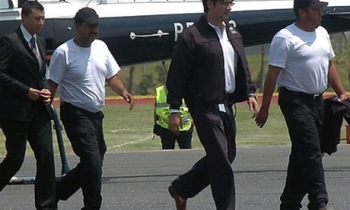Israel has barred foreign journalists from entering the Gaza Strip for a week. The move is being seen as a serious violation of press freedom.
According to media reports, military officials in Israel said only humanitarian aid workers and Palestinian patients are allowed to enter or leave Gaza as a result of the resumed shelling of rockets into Israel by Palestinians militants from Gaza.
Israeli military spokesman Peter Lerner said the restrictions were imposed because Palestinian militants have resumed their rocket fire from Gaza, in violation of a 5-month-old truce, the Associated Press (AP) reported. The only people allowed to enter and leave Gaza under the policy are international aid workers and Palestinian patients seeking medical treatment outside the territory, he said. Because Hamas "is not doing anything to stop the rockets firing into Israel, the decision is that only humanitarian movement is allowed," Lerner said.
The renewed violence on the Gaza border came as Israel said aid deliveries to the territory would be dependent on a sustained calm. Israel has kept its border crossings closed since clashes last week when it staged an armed incursion into Gaza and Palestinian militants responded with a barrage of rocket fire, according to BBC. [Link]
Israel allowed fuel shipments to resume on Tuesday, after the only power station in the territory ran out of fuel, but food and other humanitarian supplies have not been transferred to Gaza for eight days, BBC reported.
"Once again, Israel has shown its disregard for press freedom by restricting the right of foreign journalists to move freely," said Aidan White, International Federation of Journalists (IFJ) General Secretary.
IFJ is concerned that this decision is likely to have a serious impact on the proper covering of the conflict between Israel and Palestine if journalists are prevented from freely gathering, assessing and reporting information about the ongoing crisis, particularly in the Gaza Strip.
"The crisis is made worse by censorship and media restrictions which only encourage fearfulness and rumour. It's time for Israel to end the media blockade of Gaza and to allow all journalists—Palestinian and foreign alike— to do their job without interference." White said.
There was more in the Associated Press (AP) report: [Link]
"It is absolutely essential that international journalists be allowed to enter the territory and deliver their news reports to Israel and the rest of the world," said a statement from the Foreign Press Association, which represents international media covering Israel and the Palestinain territories.
"We note that humanitarian cases are still going in and out, proving safe passage is possible," added the statement, issued earlier this week. "The curtailing of journalists' right to enter Gaza is a serious violation of press freedom."
"This is Israel's policy to not show what's going on in Gaza," said Conny Mus, a reporter for the Dutch television station RTL. Mus spoke from the Israeli side of the Erez crossing, and was among 14 journalists who had unsuccessfully sought entry to Gaza on Wednesday morning. The media blackout, Mus added, was imposed under false pretenses because movement was not limited to humanitarian affairs.
"I talked to local people, local Palestinians who are going in and out for visits and meetings," Mus said. "This is the first time we basically face a situation like this. Officially they don't want to say that their policy is to keep journalists out, but that's basically what's happening here."










